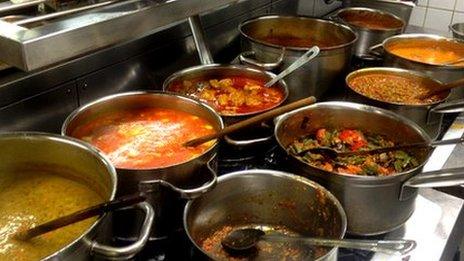The 'curry colleges’ failing to attract students
- Published

A government-backed scheme to encourage "home-grown" Asian food chefs has managed to attract just 16 people out of a possible 70 places. The so-called "curry colleges" were created in May this year to plug the gap left in the Asian catering industry by tougher immigration rules, which mean many restaurants can no longer recruit from overseas.
The Hospitality Guild, set up with £1.75m in funding from the Department for Business, Innovation and Skills, developed five "centres of excellence" across England, offering training to young unemployed people in Asian cookery. One of them was at Leeds City College, which has attracted no recruits whatsoever.
So far out of the possible 70 places, 25 people signed up but nine have dropped out of training.
It was not what the head of the hospitality faculty, Gordon Sibbald, was expecting.
"A big part of me is very surprised because I thought that quite a number of people, especially youngsters, would start being attracted to this sort of sector," said Mr Sibbald.
"It's a massive growth sector. We've something like 23% just in this Yorkshire region alone, per year, of growth in the Asian and oriental catering sector."
Around a fifth of Britain's restaurants are Asian or Oriental. And since November 2011, they have faced strict rules on employing immigrants, severely restricting their ability to recruit.
Chefs can only be recruited from abroad for posts paying over £28,000 a year, after deductions for accommodation and meals. They must also have five or more years' experience.
It means a totally new way of finding staff for some restaurants - and Gordon Sibbald says some owners are also not on board with the new plans for British apprentices.
"We know the jobs are there. The bigger restaurant groups are definitely going to be looking for more skilled staff and we've got the ideal opportunity to make that difference. I think some reluctance is coming from the fact that many restaurants have never had to look at succession planning, but the immigration cap has brought that home."
A curry college place gives students six weeks of training, including experience in a kitchen. They are then in line for a two-year paid apprenticeship in a restaurant.
One of the large companies which had said it was willing to take on apprentices was Aagrah, which has a chain of restaurants across West Yorkshire.
Director Naeem Aslam says he was always sceptical about the idea of the curry colleges and now feels the immigration rules will have to be relaxed.
"Ideally people here in the UK would be interested in working in this industry - but I don't really see that happening.
"Maybe these requirements are going to be here for a year or two but when the government realises this was a mistake, they're going to relax the rules because these businesses still need to run."
Mr Aslam says that he is not entirely surprised with that lack of take-up from young people, because he says there is a certain stigma attached to working in what many still see as curry houses.
He also believes that the work ethic of migrant workers is better.
"It's quite a hard job to do, the people that we have working in our kitchens are largely from an Indian and Pakistani background and if people haven't got anything they will stick to this and try to achieve a goal. I think maybe that's what it is, people in the UK want an easier job."
The Hospitality Guild, in charge of these centres, commissioned a YouGov survey to try and establish the barriers preventing young people entering the industry.
Executive director Suzy Jackson says there is still a problem that some young people do not want to work in a kitchen environment - but she argues that the curry house label is becoming less of a problem.
"I don't think there is such a huge stigma attached to working in an Asian and Oriental restaurant anymore," says Ms Jackson.
"We have had more than 200 people registering an interest in the programme with us via SMS, and we have some of the top employers signed-up and ready to take on apprentices such as The Cinnamon Club, Hakkasan and Café Spice Namaste, but many young people who have been unemployed for a long time lack the confidence to even turn up on the day of the interview or the first training day. They need a lot of encouragement and hand-holding."
The Guild has said it will continue to work with places such as Jobcentre Plus and the industry bodies representing Asian and Oriental restaurants to recruit people to the programme.
"With high levels of youth unemployment," says Ms Jackson, "it's frustrating that employers are still struggling to recruit and we can't fill our apprenticeship scheme."